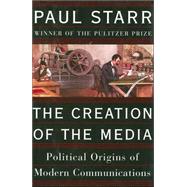
| Preface and Acknowledgments | p. xi |
| Introduction: The Political Origins of Modern Communications | p. 1 |
| Revolutions as Constitutive Moments | p. 4 |
| Communications and Power | p. 7 |
| The Path of American Development | p. 12 |
| The Opening of the Public Sphere, 1600-1860 | |
| Early Modern Origins | p. 23 |
| The Diffusion and Control of Print | p. 25 |
| Networks and News | p. 30 |
| England's Opening | p. 33 |
| France and the Transnational Public | p. 41 |
| The De Facto Public Sphere | p. 45 |
| New Foundations | p. 47 |
| Colonial Legacies | p. 49 |
| The Revolution and the Public Sphere | p. 62 |
| Constitutional Choices | p. 71 |
| Why Rights Mattered | p. 77 |
| America's First Information Revolution | p. 83 |
| The Creation of the News Network | p. 84 |
| Privacy and Public Knowledge | p. 94 |
| The Democratization of Competence | p. 99 |
| An American Revolution in Communications | p. 107 |
| Capitalism and Democracy in Print | p. 113 |
| Publishing and the Limits of Copyright | p. 115 |
| The Revolution of Cheap Print | p. 123 |
| New Publics, New Markets | p. 130 |
| Center and Periphery in Antebellum America | p. 139 |
| The Consequences of Political Choice | p. 146 |
| The Rise of Technological Networks, 1840-1930 | |
| The First Wire | p. 153 |
| A Path for the Telegraph | p. 155 |
| Monopoly on the Wires | p. 165 |
| Wiring the News | p. 177 |
| New Connections: Telephone, Cable, and Wireless | p. 191 |
| A Path for the Telephone | p. 192 |
| The Technology of Civil Society | p. 200 |
| Hello, Regulation | p. 205 |
| Wires, Waves, and Lines of Innovation | p. 212 |
| Communications and Strategic Advantage | p. 222 |
| The Making of the Modern Media, 1865-1941 | |
| Great Transformations: The Early Mass Media and the Diversity Dynamic | p. 233 |
| The Rise of Moral Censorship | p. 235 |
| Diversity and Daily Journalism | p. 250 |
| Politics, Markets, and Magazines | p. 260 |
| The Local and Oppositional Press | p. 262 |
| The Rediscovery of the First Amendment | p. 267 |
| Free Speech Becomes a Cause | p. 268 |
| War as a Generative Crisis | p. 274 |
| The Liberal Turn of the Twenties | p. 286 |
| The Framing of the Movies | p. 295 |
| The Path to the Nickelodeon | p. 296 |
| Censorship and Diversity on the Screen | p. 305 |
| The Consolidation of Control | p. 315 |
| The Constitution of the Air (1): The Origins of Broadcasting | p. 327 |
| Clashes in the Ether | p. 330 |
| Divergent Paths | p. 339 |
| The Constitution of the Air (2): Creating the New Public Sphere | p. 347 |
| New Networks, New Powers | p. 348 |
| Censorship and Diversity on the Dial | p. 363 |
| Politics and the New Public Sphere | p. 370 |
| Networks and News | p. 376 |
| Coda: The Advent of the Media | p. 385 |
| The Sources of Media Power | p. 388 |
| The Media and Democracy | p. 395 |
| Notes | p. 403 |
| Index | p. 471 |
| Table of Contents provided by Rittenhouse. All Rights Reserved. |
The New copy of this book will include any supplemental materials advertised. Please check the title of the book to determine if it should include any access cards, study guides, lab manuals, CDs, etc.
The Used, Rental and eBook copies of this book are not guaranteed to include any supplemental materials. Typically, only the book itself is included. This is true even if the title states it includes any access cards, study guides, lab manuals, CDs, etc.